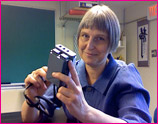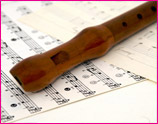Feature: Physics in Play
 Even in an era when science teachers increasingly look for exciting classroom projects, Barbara Bratzel seems to break new ground.
Even in an era when science teachers increasingly look for exciting classroom projects, Barbara Bratzel seems to break new ground.
Filed under: Special Features | Comments Off on Feature: Physics in Play
 Even in an era when science teachers increasingly look for exciting classroom projects, Barbara Bratzel seems to break new ground.
Even in an era when science teachers increasingly look for exciting classroom projects, Barbara Bratzel seems to break new ground.
Filed under: Special Features | Comments Off on Feature: Physics in Play
 In this lesson series for ages 8-18, teams of students explore the engineering behind recorder manufacturing, and then design, construct, test, and evaluate a working musical instrument using easily found materials. Time required: Two to three 45-minute sessions.
In this lesson series for ages 8-18, teams of students explore the engineering behind recorder manufacturing, and then design, construct, test, and evaluate a working musical instrument using easily found materials. Time required: Two to three 45-minute sessions.
Filed under: Grades 6-8, Grades 9-12, Lesson Plans | 1 Comment »
Tags: Manufacturing Engineering, Music engineering, Research on Learning
 Hurricane season is here, reminding us that accurate weather forecasts can be a matter of life and death in vulnerable coastal areas of the country. Even inland, severe thunderstorms play havoc with late-summer travel, and tornadoes threaten lives and property. In this lesson for grades 6 to 8, students begin by considering how weather forecasting plays an important part in their daily lives. They learn about the history of weather forecasting — from old weather proverbs to modern forecasting equipment — and how improvements in weather technology have saved lives by providing advance warning of natural disasters.
Hurricane season is here, reminding us that accurate weather forecasts can be a matter of life and death in vulnerable coastal areas of the country. Even inland, severe thunderstorms play havoc with late-summer travel, and tornadoes threaten lives and property. In this lesson for grades 6 to 8, students begin by considering how weather forecasting plays an important part in their daily lives. They learn about the history of weather forecasting — from old weather proverbs to modern forecasting equipment — and how improvements in weather technology have saved lives by providing advance warning of natural disasters.
Filed under: Class Activities, Grades 6-8, Grades 6-8, Grades K-5, Lesson Plans | 1 Comment »
Tags: Environmental Engineering, Research on Learning, Technology for Learning, Wind Technology
 With cash incentives and coaching, a Texas-based initiative dramatically improves minorities’ success in science and math.
With cash incentives and coaching, a Texas-based initiative dramatically improves minorities’ success in science and math.
By Margaret Loftus
Filed under: Special Features | Comments Off on Feature: Flight to Achievement
Ready, Set, Science! provides a synthesis of groundbreaking research into teaching and learning science in kindergarten through eighth grade. This book summarizes a rich body of findings and builds detailed cases of science educators at work to make the implications of research clear, accessible, and stimulating for science educators.
Filed under: Web Resources | Comments Off on Ready, Set, Science!
Tags: Research on Learning
 What is science for a child? How do children learn about science and how to do science? Drawing on a vast array of work from neuroscience to classroom observation, Taking Science to School provides a comprehensive picture of what we know about teaching and learning science from kindergarten through eighth grade.
What is science for a child? How do children learn about science and how to do science? Drawing on a vast array of work from neuroscience to classroom observation, Taking Science to School provides a comprehensive picture of what we know about teaching and learning science from kindergarten through eighth grade.
Filed under: Grades 6-8, Grades K-5, K-12 Education News | Comments Off on Taking Science to School
Informal science is a burgeoning field that operates across a broad range of venues and envisages learning outcomes for individuals, schools, families, and society. The evidence base that describes informal science, its promise, and effects is informed by a range of disciplines and perspectives, including field-based research, visitor studies, and psychological and anthropological studies of […]
Filed under: Uncategorized | Comments Off on Learning Science in Informal Environments
Tags: After School, Research on Learning, Technology for Learning
Andrew N. Meltzoff, Patricia K. Kuhl, University of Washington, Seattle; Javier Movellan, Terrence J. Sejnowski, University of California at San Diego Abstract Human learning is distinguished by the range and complexity of skills that can be learned and the degree of abstraction that can be achieved compared with those of other species. Homo sapiens is […]
Filed under: Web Resources | Comments Off on Foundations for a New Science of Learning
Tags: Research on Learning
Summary of a recent report from the National Academies: Early childhood mathematics is vitally important for young children’s present and future educational success. Research has demonstrated that virtually all young children have the capability to learn and become competent in mathematics. Furthermore, young children enjoy their early informal experiences with mathematics. Unfortunately, many children’s potential […]
Filed under: Uncategorized | Comments Off on Mathematics Learning in Early Childhood